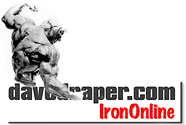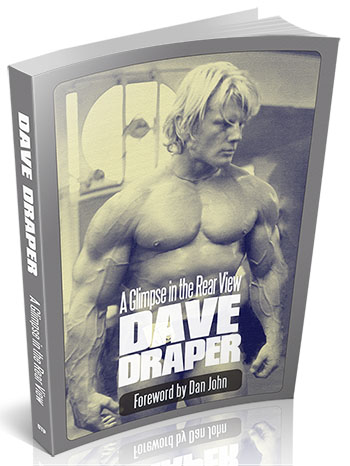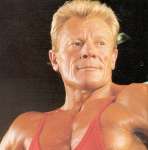Training Past 40
Flex Magazine March 1990
"Learn, think, power on and press on."
If you've been training since your teens or twenties and you're now over 40 you know, of course, you're hooked. You can't let go. But then conventional wisdom slaps you in the face and tells you you're in for a change in your training and expectations.
Being well into my 40s, I have discovered that the most intimidating enemy in the process of advancing years is conventional wisdom itself. Constantly we are told that we must hold back, that training, regardless of age, stresses our muscles, which leaves slight tears, which in turn leaves scars, eventually resulting in injuries, and that the older we get and the longer we train, the more injuries accumulate. Caution must be the order of our days as we pass 40.
Decreasing muscle response and increasing skin elasticity also take their toll, we are told, so look for other benefits. Don't expect to make gains. Give it up. Settle for maintenance.
For a few years in my forties, I submitted to that conventional wisdom. I did hold back, feeling the accumulated injuries of more than 30 years of bodybuilding, especially in my shoulders, elbows and lower back. Those injuries were real, and their persistence convinced me that I could no longer train as fast as I had in my youth, that I required longer recovery periods, that my durability is not what it was and that, where I used to go for that last rep, I must hold back or else possibly suffer another injury that might halt my training for good.
I persuaded myself I should simply be glad I'm alive and that, along with cumulative injuries, age also brings compensatory gains in wisdom, and that I should put that wisdom to use by accepting age gracefully. Now I see that just as the mere awareness of age can affect your ego and attitude, so can a more confident and determined attitude awaken you to the fact that the other side of 40 holds a valid promise for improving your physique.
The hint of this has always been with me, even recently in my more timid years. There's not much difference in my training now versus when I was in my twenties. I'm still doing some of the same things - old-fashioned stuff I was doing years ago - and I do them now with as much vigor and enjoyment as I did then; in fact, with more enjoyment than I had then. No longer do I have the apprehension when approaching my workouts that was there when I was younger. I also notice I'm reluctant to hold back, that I love to push to the limit. That's when I'm happiest, and age has not at all been able to quell those feelings.
Bodybuilding's new popularity fed this feeling. It's no longer a subculture but embraced by the public, and seeing it around me fuels my enthusiasm all the more. Just as I am constantly reminded of cumulative injuries when I train, I am constantly reminded of my love of bodybuilding by those around me.
My marriage to Laree revived this spirit, and opening our World Gyms allowed it to range. Even these days when I go into the gym, I see lots of youngsters around me training vigorously and I have this yearning to do it also. I want to be part of the training.
Gradually, I stepped out of the maintenance level and looked toward
greater intensity in my training, reincorporating that same locomotion
and thrust in the movements that I always had, always loved and
still do.
I am looking for what I can do at this new stage of my life in pursuing
gains, but there is a difference now, and it's one that can come
only with maturity. I find myself wanting to practice wisdom and
not be foolish. I see myself progressing heavier in my weights,
but instead of gulping it all at once, I'm now sipping it gradually,
savoring it and enjoying it more, taking my time to get up there,
stretching out the goals.
Never have I competed with others in my workouts, never have I tried to keep up with others in the gym, and that's even more important now. I have always been in competition only with myself.
I do feel fortunate to be entering this new stage of life hand in hand with nutritional advance such as amino acid technology and better supplements. All of these modern factors allow me to get a tighter rein on my body and its improvement. They also enable me to remove many perceived restrictions to over-40 training and allow me, instead, to set more goals, to approach my training aggressively rather than defensively while doing everything I have to do with more attention and more experimentation rather than just plunging forward and pounding away.
At this stage of life, I don't need as much work because I know how to train better. In fact, I now suspect that I have overtrained all my life; now by holding back somewhat, watching my training and having another kind of patience, it is possible that I can step forward and make some significant gains. However, once you're accustomed to overtraining, it's difficult to relax or cut back, regardless of your age.
Even now, I experiment with power training, going for single reps here and there. That is mingled with supersetting, although just once a week I have a heavy squat day and heavy benches.
Since I have reduced my workouts from six days a week to three on, one off, I encounter fewer injuries, plus my strength is coming up. But the biggest problem is adapting to it, breaking the old habit, even though this new system is, I am convinced now, a better way to train. That's why stepping out of an overtraining schedule, persuaded on me by age, may allow me to proceed to another plateau.
Mentally, I also find that my focus is now on the finer mechanisms of the body rather than on simply a brutish workout and ego gratification. I now use more full-range movements and quality training with a good flow. Certainly I also do more stretching and warming up now, especially for the lower back, hamstrings and shoulders.
I'm working chest and back one day, legs on day two, and shoulders and arms on day three. That gives me upper body, lower body, then upper body again and a day off, allowing each bodypart more recuperation. Aerobics have also increased, specifically in my use of Lifecycles and Stairmasters.
I'm looking forward to gradually increasing powerful workouts. For chest and back, it's four sets of bench presses supersetted with wide-grip pulldowns, but now incorporating more power. I love that. It's very famous with me and gives me a good feeling. After the supersets, however, I will do two or three more sets of bench presses, taking my time with the attitude that it's my profession - more of my profession now than it's ever been - since I now own a gym. I want to appear good to the people, set a good example in both physique and performance of the exercise movements, do them correctly. It's fun and they like to see it. I also now do some single reps, putting power behind them, primarily for the fun of it.
As the power increases in my workouts, I'm also dropping my reps from 10-12 to more like 8-10. You resist age just as a young bodybuilder builds mass: If you want to maintain, go with the higher reps; if you want to proceed, you have to lower them. Just be careful how far you push it; don't always do that one last rep.
I also notice that I have to do lots of good eating - plenty of good protein and complex carbs every two to three hours. The body must be constantly fed for both repair and for fuel during a hearty workout. I am also keeping my electrolytes higher and am experimenting more with branch-chain amino acids. Essentially, I am trying to put everything in my favor as age advances; keeping my workouts slower and more concentrated, making sure I harness that hyper-energy in my movements, doing regular deadlifts instead of stiff-legged deadlifts, paying attention to reps, thinking about my lower back and knees, and trying to go consistently heavier.
On leg day, I warm up with leg extensions and go right into squats, then extend that into pretty much a power routine. My training partner now is a powerlifter - Doug Rock, a member of the San Jose (California) police department who recently won gold medals in both the World Police and Fire Games and the California State Olympics, and who is also nearing 40.
Training with Doug provided further encouragement and pride in continuing to want to progress with more powerful, heavier workouts. Having a positive influence and outlook such as Doug's alongside contributes to much more than maintenance. He has helped turn me on to that aspect of training again, trying to get more deep muscle growth, slowly ranging upward in my weights while being attentive, even though we all know how it is with training partners; those delightful competitive urges continue to surface so we must be vigilant of them.
While a certain training approach worked for me when I was young, I now face the question of what will work best for me now, at a later age. What can I now do to not merely maintain but to actually improve?
I feel there is probably one plateau from ages 40 to 45 and another from 45 to 50, but with each one I can strive to go a little above the one that proceeded it. Maybe there will be another one somewhat above 50 when I will have to relinquish a little more. By then I will have gained more wisdom and will have found new ways to compensate. I hope that what's going to happen is that a maturity process will have taken place that can allow me to put egoistic concerns on the back burner and proceed with realistic objectives in other facets of life that make "not letting go" an even stronger impulse.
I have to keep adjusting my goals according to my capabilities, but I always keep my goals out there, and they generate a good energy, a constant and fresh energy. Now being a gym owner, I have taken another new step in my life, and such attempts outside training itself also help generate that energy.
The most profound discovery I made after passing 40 is that life is more and more a learning experience. In youth, education seems to be the lowest of priorities, for there are appetites to be explored and egos to be nurtured. Beyond 40, however, a maturity normally occurs in which your appetites change. That is a result of time, and we are struck with the realization that there is so much more to life that can provide gratification than we can possibly assimilate. Suddenly our simple hungers seem insignificant.
That is when the journey beyond 40 becomes a reward. It's a reawakening to what more there is to life. It's an awareness that you are just starting; actually, that you are always just starting.
What I have learned over the past 10 years, I want to triple over the next 10. I find that I have so many more feelers out there trying to absorb everything. I noticed that I didn't learn what I should have in previous years, so now I had better start scurrying around and paying a lot more attention.
These days I realize how blessed I am to have the energy and desire to train as I do, and I thank the Lord for that. Everything I have said in this article has been so obvious, but it seem that little of it sinks into a young mind. A "youthful mind," on the other hand, absorbs so much more of it. Perhaps that's the greatest irony of aging: You don't acquire a youthful - hungry - mind until you have been liberated from being young
More magazine articles featuring or written by Dave
Click here for the Dick Tyler Gossip Roundup archive
Of course, don't forget Dave's current weekly column


